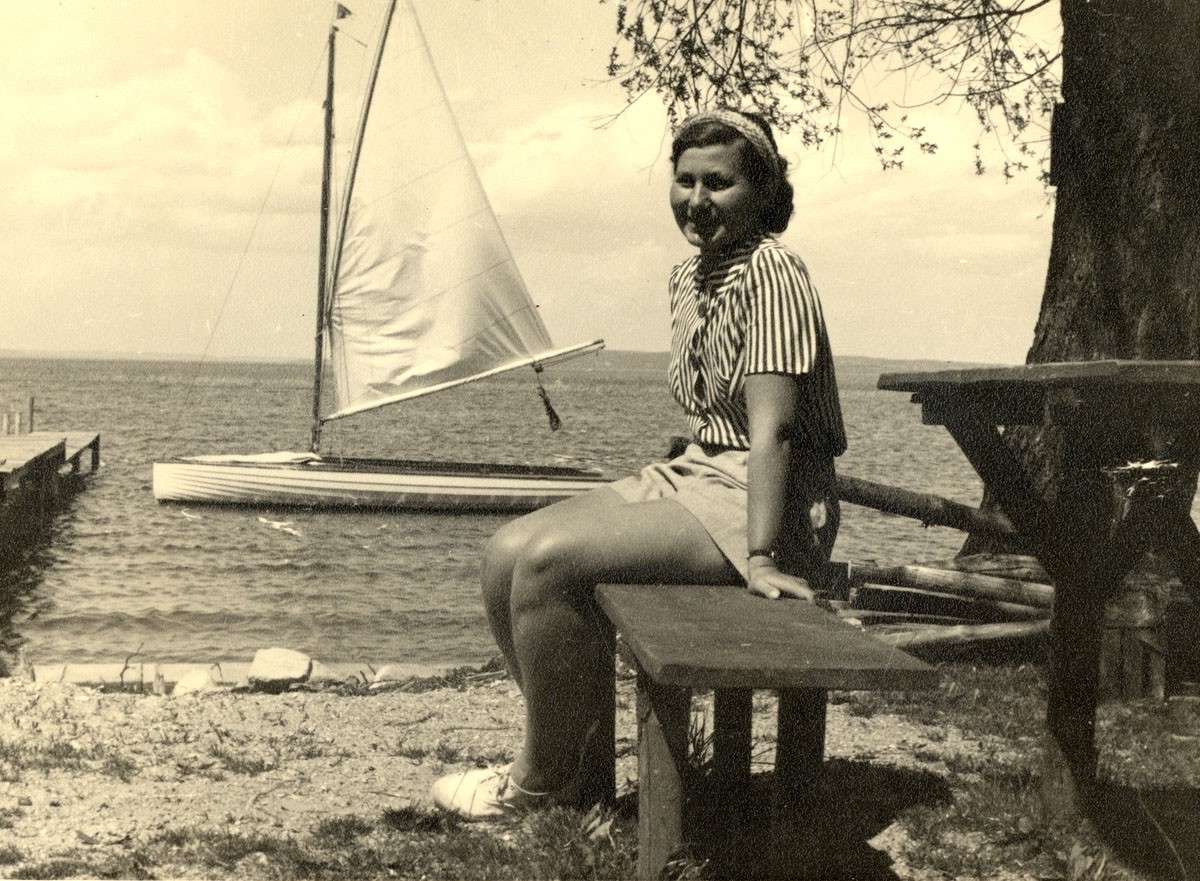Remembered and Retold - Life Story of the Otto Family
Chapter 30
From Freiburg to Munich
The winter of 1938-1939 was a time of change. We still lived in Freiburg, but my sister Gretl was planning a wedding in spring and was going to move to Munich. Susi was finishing her training as a registered pediatric nurse. I took a few classes at the university, made some clothes for myself including a ball gown and did much socializing. There were enough opportunities for dances and skiing trips in the Black Forest. My father's fraternity had a two story-cabin in the mountains run by a caretaker. This was a convenient place for a weekend retreat. Girls slept in rooms, boys in the loft, and there were always chaperons around.
More and more of Hitler's "brown-shirts" were on the streets. They made us a little uneasy, as did the inflammatory articles in the newspapers. Some other restrictions came out of the blue sky. One could still travel to other countries but was not permitted to take more than 20 marks over the border. Once we managed to go skiing to Davos, Switzerland, for a weekend with four skiers and 80 D-marks in the car. The tank was full of gasoline plus extra canisters for the return trip. We had plenty of food for the two days. We slept in a farmhouse outside of town, but the rest of the money was not enough to ride the famous cable car up to the glaciers. The two male students volunteered to hike on their skis with sealskins all the way up, while we girls had just enough money to get to the middle station. We planned to meet the hikers at one of the huts and climb the last stretch together. One ten-mile run was to be the reward in the afternoon. The glacier was not steep and no tree or rock was in our way. Then the run funneled into steep narrow valleys full of trees. At times the snow turned into ice, at times into slush. We bypassed the first small villages, climbed over fences, skied along plowed roads and crossed through meadows and woods. Our goal was a village in the valley with a train station. With our very last Swiss money we bought the tickets back to Davos and the car.
Munich was a town to which Susi and I gladly followed our older sister. She had bought a house in Schwabing, and we found a three-room apartment about 10 blocks away. This part of the town was where the artists lived and things were happening. We felt at home. Life was beautiful. It was the summer of 1939.
Susi found a job, and I enrolled in a private art school. We had enough time to explore the countryside. By saving our money, we planned to take a sailing trip from Split to Corfu, down the Adriatic Sea in August. The big two-mast ketch belonged to the National Sailing Association, to which we had belonged ever since we had taken sailing courses at a Bavarian lake. The ship had a captain, a navigator, one hired hand and a cook. The 20 passengers were not only the paying guests, but also the crew. We slept in double-decker bunks in the main cabin. Privacy, comfort and washing facilities were minimal. The blue and warm Adriatic with its many secluded coves made up for discomforts. We spent the time mostly on deck under sun-sails or in the water. Almost every day a visit to one of the many tiny old villages became a highlight. I remember especially Dubrovnik and Hvar, walled cities, quaint harbors with colorful fishing boats, narrow cobblestone streets and friendly people. We sipped the sweet wine on the plazas and then sailed away into the sunset. Smooth sailing between the islands was interrupted by rough seas outside. Sometimes almost everyone hung over the rails and we struggled bringing some of the sails down.
Our peaceful vacation was interrupted by rumors of war. We were stunned when, at the end of August, we arrived in Munich to see marching men in field uniforms, and tanks and trucks rattling down the streets in feverish activity. Radio and newspapers joined in the commotion and gave only the news we were supposed to hear. Borders were closed. War started on September 1. The Nazis tried to infuse national pride into the public. We both, Susi and I, volunteered for the Red Cross. The courses were held across town in the evenings. Bicycles were our only transportation. Because of the fear of air raids, the streets were dark and the window shades had to be drawn. Our enthusiasm to aid the war effort slackened when winter weather set in. After we missed some meetings, our waning ardor backfired. Absentees were drafted to serve in the air-raid shelters around town. My bunker was in the old Academy of Arts building. My boss was a retired nurse, the rest were middle-aged housewives. They let me go to my school and make up by spending evenings or nights in the bunker. There was nothing to do except listen to the radio, sew or knit and chat.

Summer 1939 at the Ammersee Sailing School
© Irmgard
& Jürgen Otto 1993 All
rights reserved
Zuletzt geändert: 04.08.2024 13:58:46